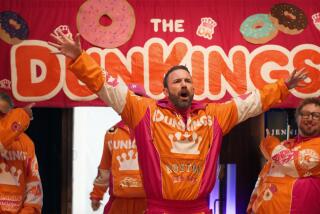Under a financial blitz The economy tackles the Super Bowl
TAMPA, FLA. — Ed Palladini has run a limousine company in Tampa for 27 years, accumulating a fleet of more than a dozen luxury cars, ranging from a basic Cadillac sedan to a plush Mercedes minibus that seats 14.
Even now, during Super Bowl week, when Palladini’s business should be booked solid, some of those beauties will not leave the lot.
“I’ve got a car that hasn’t moved in six months, but I’ve had to keep the insurance on it for the Super Bowl,” he said. “All your big executives, they aren’t coming like they did when the Super Bowl was here in 2001. And if they are, they want Town Cars or SUVs or 15-passenger vans. They don’t want to be seen in stretch limousines.”
Both locally and nationally, this Super Bowl week -- which culminates with today’s game between the Pittsburgh Steelers and the Arizona Cardinals -- is as much about setting the right economic tone as it is about scoring touchdowns.
“I think we’ve been very cognizant of the fact that our resources are limited and that everyone’s resources are limited,” Tampa Mayor Pam Iorio said in a news conference that kicked off the week. “We are going to put on a first-class Super Bowl in the most frugal way that we possibly can, and that’s been our approach.”
In a Super Bowl study released in mid-January, auditing firm PricewaterhouseCoopers predicted that personal and business spending cutbacks will result in “fewer visitors and media, a shorter average stay per visitor, and less spending in the hospitality and related areas.”
The firm projects $150 million in direct spending tied to Super Bowl weekend, 22.3% less than when the 2008 game was held in Glendale, Ariz.
In the days leading to the game, there were still hotel rooms available in Tampa and surrounding areas, although most required a minimum stay of three or four nights. Among the cities of Tampa, St. Petersburg and Clearwater, there are roughly 46,000 rooms of lodging, ranging from large hotels to bed-and-breakfast inns.
“I did hear from a couple hotels that they saw more room requests from individual fans this year, when they normally would have expected more group and corporate business,” said Steve Hayes, executive vice president of Tampa Bay & Co., the area’s convention and visitors bureau.
The Super Bowl is still America’s biggest annual sports extravaganza, one that the National Football League expects to draw a television audience of 140 million viewers.
However, the country’s economic downturn has had an undeniable effect on the festivities leading up to the game, with everyone feeling the pinch -- from large corporations and the ultra-rich who pay top dollar for exclusive parties and prime game tickets, to the caterers, cab drivers and local small-business owners who see Super Bowl week as a once-in-a-blue-moon boost to their bottom line.
Sports Illustrated and Playboy magazines canceled their parties -- both signature events of Super Bowl week -- and Cadillac scrubbed its annual celebrity go-kart race. Likewise, with sponsorship and paid-appearance opportunities dwindling, an untold number of NFL players opted not to make the trip.
“My dance card is still filled, thank goodness,” said retired New York Giants star Michael Strahan, who had television and radio gigs all week. “. . . But I know a lot of players who didn’t come down here. The economy has made a big difference. You can’t deny that.”
Strahan went from seat to seat along so-called radio row at the Super Bowl media center, a large conference room filled with remote setups for sports-talk hosts and producers from all over the country. Many of the folding tables were vacant, unthinkable at other Super Bowls.
“Normally, you’re yelling over people just to hear yourself,” said Mike Mulligan, who hosts a show for Chicago radio station WSCR and is a sportswriter for the Sun-Times, which paid for the trip. “This year, I miss screaming.”
Even so, Super Bowl XLIII is a grand-scale event. Tampa is awash in NFL flags and banners, and Raymond James Stadium is decorated with towering action shots of the game’s starting quarterbacks: Arizona’s Kurt Warner and Pittsburgh’s Ben Roethlisberger. Adorning the glass facade of a downtown hotel is a 20-story picture of taped hands gripping the Lombardi Trophy, presented to the winning team.
“It’s a week of major league schmoozing and entertaining, doing business, and, oh, coincidentally, there’s a game tucked in there somewhere,” longtime NFL player agent Leigh Steinberg said. “The rule of thumb at the Super Bowl is, if you think you see someone of celebrity or prominence, it actually is that person.”
That’s particularly true at one of Steinberg’s afternoon parties, which he has thrown at each of the last 23 Super Bowls, through the most robust and lean years of his practice. Among the attendees are political figures -- he says one party had 17 U.S. senators -- Hollywood celebrities, and, of course, athletes.
Still, he opted to do away with his annual but lesser-known night party and said the tone in recent years has been geared more toward charities than conspicuous consumption.
At least one Super Bowl expert believes revelers haven’t seen the worst of it, and that next year’s game in Miami could be affected to an even greater degree because the recent economic plunge happened when party plans were already in place.
“In September and October, when things were happening, 90% of the Super Bowl stuff was in place,” said Allen St. John, author of the book “The Billion Dollar Game,” a behind-the-scenes look at the Super Bowl. “It’s costing people money to cancel things. It’s like canceling a wedding the day before it happens.”
St. John said the scaling back some companies have done is “as much about the perception of things, not wanting to stand out.”
Successful as it has been, the NFL is not immune to the economic crunch. It is in the process of laying off 150 employees, even as the average valuation of individual franchises has for the first time topped $1 billion, according to Forbes magazine. That’s up 8.7% from 2007 and 66% from five years ago.
Late last year, the league announced it would sell 1,000 tickets to today’s game at $500 each -- $300 less than the face value of most tickets. A league spokesman said that was in recognition of what fans are going through.
The bulk of Super Bowl tickets are priced at either $800 or $1,000, although they would still be a steal at that price. According to ticket broker Stubhub, the average ticket price on the secondary market was $2,513 at midweek.
Predictably, there were no problems selling out today’s game. That’s never an issue for the Super Bowl, even though the Cardinals do not generate the type of national interest of National Football Conference teams such as the Giants, Dallas Cowboys or Green Bay Packers. Like everything surrounding the game, the ticket prices are reflective of the sagging economy.
Throughout the week, on the secondary markets, tickets were selling at far closer to their face value than they did last year. That’s a factor of the teams involved, of course, and also the economic climate.
“You don’t have the backing of corporate America that can pull the ticket at the right price and not have remorse about it,” said Dan Rubendall, founder of Zigabid.com, an online ticket negotiation site. “The bottom line is, the consumers aren’t spending, and the corporations aren’t spending.”
Rubendall added, however, that the Super Bowl is the Super Bowl.
“In any market, it’s usually the biggest event of the year,” he said. “And it should continue to be.”
--
More to Read
Inside the business of entertainment
The Wide Shot brings you news, analysis and insights on everything from streaming wars to production — and what it all means for the future.
You may occasionally receive promotional content from the Los Angeles Times.











